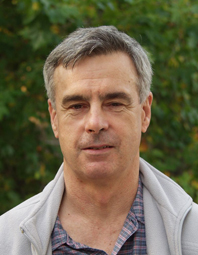
John Steel, Ph.D.
Professor of Mathematics
University of California, Berkeley
Born in 1948 in Stockton, CA
Studied Philosophy at Stanford University and Philosophy and
Mathematical Logic at the University of California, Berkeley
Focus
Inner Model Theory
Project
Canonical Inner Models for Strong Large Cardinal Hypotheses
Strong axioms of infinity have been a focal point of research in the foundations of mathematics for over 40 years. There are at least two reasons for this. First, many natural mathematical statements are neither provable nor refutable using only ZFC, the commonly accepted set of axioms. One can remove significant parts of the incompleteness of ZFC in a natural way by strengthening its axiom of infinity. Second, there is the remarkable phenomenon that for any natural theory T extending ZFC, there seems to be a theory S obtained by adding strong axioms of infinity to ZFC such that the consistency of T is equivalent to that of S. In this way, strong axioms of infinity give us a sort of yardstick that we can use to calibrate the strength of arbitrary extensions of ZFC.One important way of understanding and using strong axioms of infinity is to construct canonical minimal universes of sets in which these axioms hold true. The prototype for these "inner models" is Godel's universe L of constructible sets. At the moment, we have a good theory of such inner models in many cases, but we have not been able to construct them for some of the most useful strong axioms of infinity. The goal of this project is to construct inner models for these axioms.
Recommended Reading
Martin, Donald A. and John R. Steel. "A Proof of Projective Determinacy." Journal of the American Mathematical Society 2 (1989): 71-125.
Martin, Donald A. and John R. Steel. "Iteration Trees." Journal of the American Mathematical Society 7 (1994): 1-71.
Steel, John R. "Mathematics Needs New Axioms." Bulletin of Symbolic Logic 6 (2000): 422-433.
Colloquium, 14.03.2006
Gödel's Program
Gödel's program is an approach to the question: what are the proper axioms for mathematics?
A provisional answer to this question emerged in the late 19th and early 20th century. It was shown then that all mathematical statements could be made in the language of set theory, and that all theorems proved up to that time could be derived from a certain list of basic statements about sets. That list is known as Zermelo-Fraenkel Set Theory with Choice, or ZFC.
Kurt Gödel's celebrated theorems of the 1930's showed that ZFC is incomplete in important ways. In particular, by results of Gödel (1937) and Cohen (1963), ZFC neither proves nor refutes Cantor's Continuum Hypothesis. Gödel's work also suggested a way to remove the incompleteness of ZFC in some cases, namely, strengthening the axiom of ZFC which asserts the existence of infinite sets. This led him to formulate, in 1947, Gödel's Program: Decide mathematically natural questions, such as the Continuum Hypothesis, in well-justified extensions of ZFC, for example, by adding strong axioms of infinity.
In my talk, I shall describe more carefully the origins of Gödel's program, and outline some of the work which has been done in it. I shall also discuss some of the broader philosophical issues it raises.
